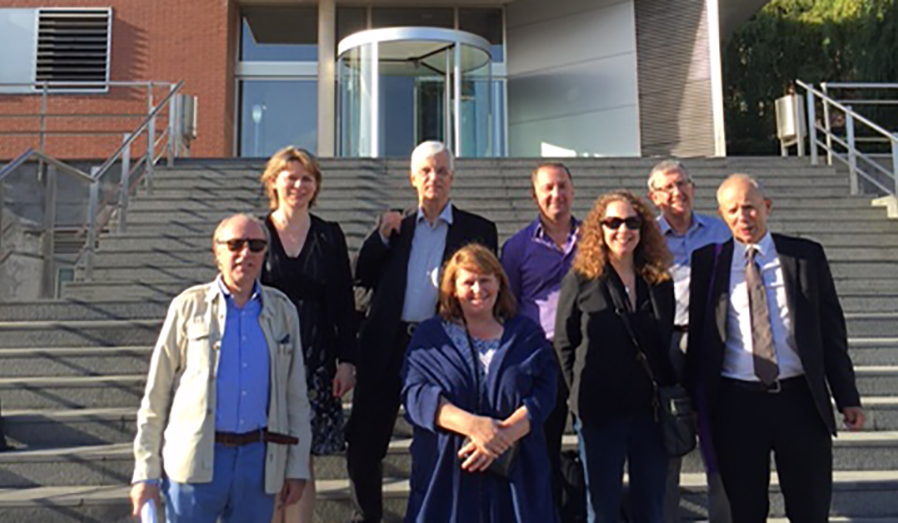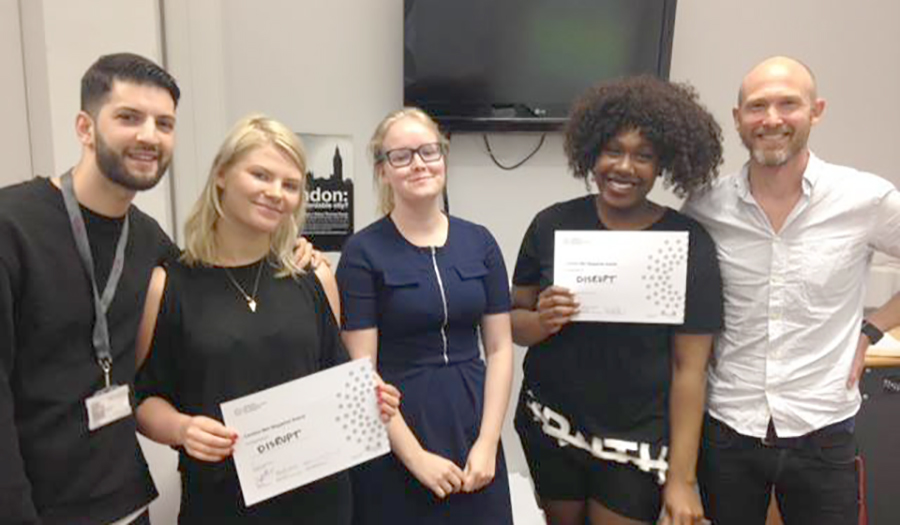Apply for this course
Please select when you would like to start:
If you're a UK applicant wanting to study full-time starting in September, you must apply via UCAS unless otherwise specified. If you're an international applicant wanting to study full-time, you can choose to apply via UCAS or directly to the University.
If you're applying for part-time study, you should apply directly to the University. If you require a Student visa, please be aware that you will not be able to study as a part-time student at undergraduate level.
If you're applying for a degree starting in January/February, you can apply directly to the University.
Apply to us for January 2025
If you're a UK student or an EU student with settled or pre-settled status applying for January 2025, you can simply call our hotline on 0800 032 4441 or complete our fast-track online application form.
Why study this course?
Designed to equip you for a successful career in marketing communications and public relations, this undergraduate degree course explores the drivers and dynamics of the communications industry, covering the key elements of modern theory and practice.
Studying in London means you'll be immersed in one of the world's most important centres for advertising, communications and public relations with plenty of opportunities for industry experience. The course is recognised by the Chartered Institute of Public Relations and you'll also have the opportunity to apply for accreditation from the Chartered Institute of Marketing.
Study in the UK's advertising hub
You'll study in one of the world's most important centres for advertising, communications and public relations with plenty of opportunities for industry experience
Study a course approved by the CIPR
This course is recognised by the Chartered Institute of Public Relations (CIPR)
Become accredited by the CIM
While studying this course you will have the opportunity to apply for accreditation from the Chartered Institute of Marketing (CIM)
Course modules
The modules listed below are for the academic year 2024/25 and represent the course modules at this time. Modules and module details (including, but not limited to, location and time) are subject to change over time.
Year* 1 modules
Year 2 modules
Year 3 modules
Learning Through Organisations
This module currently runs:spring semester - Tuesday afternoon
spring semester - Tuesday morning
spring semester - Wednesday afternoon
spring semester - Wednesday morning
spring semester - Thursday morning
spring semester - Thursday afternoon
(core, 15 credits)
This Professional Practice module will enhance the students’ understanding of what it means to be a business professional. This module will support the preparation for their future career by encouraging them to develop, put into practice and evidence the skills and behaviours that employers want to see.
The ‘Professional Practice’ approach ensures that as a developing professional the students understand how to learn effectively and efficiently either in the workplace or in a simulated context. They also learn how to use all the resources available to reflect on their progress. This module involves planning, conducting and reflecting on their own ‘performance episodes*’ and a more general reflection on their overall professional development to date. The written reports and reflections become part of their growth and productivity E-portfolio** which they will maintain throughout their programme.
In addition, they will have the opportunity to test, review and evidence their skills development via the on-line resources provided throughout the programme, which support the general skills required by employers. As such this module aims to,
1. Build understanding of the expected workplace knowledge, skills, competencies and attitudes so that they become intrinsic performance and growth motivators.
2. Ensure the adoption of skills, attitudes and behaviours that improve self-awareness to aid reflective practice.
*A performance episode is defined as an initiative that the students take, made up of tasks, which develops their skills, and which involves both selecting knowledge from the programme and interacting with others. It must be measurable so that they are able to reflect on their professional skills development.
** The growth and productivity E-portfolio is a digital internet-based tool within which they will store all evidence of their Weekly via learning log, feedback from stakeholders, their reflections. It allows them to share their journey with others and to organise elements of it to help them progress further.
Read full detailsManaging People in Organisations
This module currently runs:spring semester - Monday morning
spring semester - Monday afternoon
spring semester - Tuesday morning
spring semester - Tuesday afternoon
spring semester - Wednesday morning
spring semester - Wednesday afternoon
spring semester - Thursday morning
spring semester - Thursday afternoon
spring semester - Friday morning
spring semester - Friday afternoon
(core, 15 credits)
This module provides an introduction to the management of people in organisations, or as it is commonly known ‘Human Resource Management’. It is aimed at students from a variety of disciplines, and not just those looking to pursue a career in HRM. Ultimately, the management of people is often the responsibility of line managers and supervisors so it is important that all graduates of Guildhall School of Business and Law are equipped with the knowledge and skills to implement this effectively in practice. This module will take a critical perspective, illuminating to students not only the ways ‘good’ people management can contribute to performance and employee well-being but also the potential problems implementing this in practice.
Read full detailsMedia Culture and Society
This module currently runs:autumn semester - Monday afternoon
autumn semester - Wednesday afternoon
autumn semester - Friday morning
(core, 15 credits)
In an age of mass communication we are constantly bombarded by messages through advertising, content marketing, editorial, programming and other forms via the press, television, radio, film, music and the internet.
As such, the media is a powerful dynamic force and cuts through gender, class, race, creed, and nationality to form bonds between groups of people who may exist in totally different circles, potentially bringing us closer to a global culture. Social & cultural values are largely shaped and reflected by the consumption of media and this module seeks to provide students with an insight into the media industry and also act as introduction to models and tools designed to enable them to engage in a more deeply informed debate on this constantly changing subject.
The module aims to introduce students to the nature and make-up of the media industry and undertakes a critical examination of the role of culture and society in determining its development. It will examine both traditional and new media/digital platforms as part of a wider analysis of its influence on culture & society. Additionally the module aims to provide an introduction to the learning strategies that students will need to successfully study in higher education.
The module also aims to assist students in the acquisition and development of the following skills:
1. Academic Reading
2. Research
3. Application of Knowledge and Presenting Data
4. Communicating/presenting – orally & collaborating / working with others
5. Critical Thinking and academic Writing
6. Self- assessment/reflection
Practice of Marketing
This module currently runs:autumn semester - Monday morning
autumn semester - Wednesday morning
autumn semester - Friday afternoon
autumn semester - Friday morning
autumn semester - Wednesday afternoon
(core, 15 credits)
The module aims to provide an understanding of the theories of marketing and the practical application of the tactical tools of marketing in contemporary and technology driven organisations at local, national, regional and in a global context. In this module, students explore how different types of organisations deploy the marketing mix tools to implement their marketing strategy and to develop a competitive edge.
The module aims to:
● Provide an understanding of the theories involved in creating and delivering value to customers using the tactical tools of marketing.
● Explore the practical application of the marketing mix in product/services, public sector/non-profit sectors marketing.
● Develop students’ academic writing, application of knowledge and interpreting data skills.
● Develop students’ researching and analysing skills.
Principles of Marketing
This module currently runs:spring semester - Monday morning
spring semester - Monday afternoon
spring semester - Tuesday afternoon
spring semester - Wednesday morning
spring semester - Friday morning
spring semester - Friday afternoon
(core, 15 credits)
The module aims to provide an understanding of the marketing process in contemporary organisations and in the context of tangible goods and services. The service sector accounts for a significant proportion of GDP and employment in most developed economies and therefore it becomes essential for students to gain insight within the area. In this module, students are introduced to a range of marketing theories such as the marketing concept, consumer behaviour, business environmental analysis, marketing research, consumer insights applicable to tangible goods and services marketing.
The module aims to:
● Provide an understanding of the theoretical foundations and practical application of marketing
● Provide an appreciation of contemporary issues in marketing.
● Develop students’ academic writing, application of knowledge and data interpreting skills.
● Develop students’ researching and analysing skills.
Public Relations
This module currently runs:autumn semester - Tuesday afternoon
(core, 15 credits)
This module will develop an understanding of the role and purpose of Public Relations (PR) together with an appreciation of the societal context and global business environment within which PR operates. Given the range of course subjects sectors that this module will contribute to, many of the cases and industry practice examples employed will directly relate to the creative industries such as Fashion, Music, Events & Tourism.
In addition and from a more generic practical perspective, it will also aim to develop students’ writing skills with a specific focus on public relations content copywriting for both analogue & digital media platforms.
The module provides an introduction to the breadth of oral, written and graphic public relations material, such as press releases, articles, photography, video, social media and related digital content, press notices that are key creative elements of public relations campaigns. The module also considers how the media interacts with public relations practitioners via such forms of communication material and how the media goes on to use various platform contributions from the public relations sector.
Additionally, in recognition of the huge increase in global social media usage, the module will examine how this has resulted in an explosion of user-generated content that is significantly influencing how PR is practiced in the 21stC.
Given this changing nature of PR practice the module will:
● Examine and analyse the various specialisms within PR practice as set out by the Chartered Institute of Public Relations
● Examine the current research
● Develop an understanding of the wide range of career options within public relations and more broadly, communications management.
In terms of learning related outcomes, the module will promote various graduate attributes, in particular the application of knowledge; communicating and presenting (including inter-cultural communication); critical thinking and writing; reflective professional skills; project and event management; and business and political awareness - together with various other elements in the LMBS Skills Framework.
Read full detailsUnderstanding and Managing Data
This module currently runs:autumn semester - Monday morning
autumn semester - Monday afternoon
autumn semester - Tuesday morning
autumn semester - Tuesday afternoon
autumn semester - Wednesday morning
autumn semester - Wednesday afternoon
autumn semester - Thursday morning
autumn semester - Thursday afternoon
autumn semester - Friday morning
autumn semester - Friday afternoon
(core, 15 credits)
Data analysis is a top business priority. It drives the opportunity for performance improvement and, with advances in technology and software, data are generated at an ever increasing rate. As such, it is not surprising business data analysis and software skills are among the top graduate skills sought by employers today. Understanding and Managing Data, responds to these market demands by providing the underpinning skills required to make effective use of quantitative and statistical analyses and develops students’ interpretation and reporting skills.
The module introduces data-based decision making and performance measurement and provides students with the practical experience of using Excel to transform data into meaningful information. It further introduces students to forecasting, target setting and project management. As such, it provides students with an understanding of the fundamentals of statistical methods for business decision making. In doing so, it provides the skills and knowledge required for levels 5 and 6 modules, including the dissertation and consultancy project, that develop and evaluate the quantitative aspects of business management.
Overall, this module develops the analytical and communication skills relevant to understanding business information, with an emphasis on problem-solving techniques in the context of business management, decision making and performance measurement.
Understanding the Business and Economic Environment
This module currently runs:spring semester - Wednesday afternoon
spring semester - Wednesday morning
(core, 15 credits)
The focus of this module is to equip students to understand organisations in contexts past, present and future, and enable them to analyse the macro, micro, internal and external business and economic environments in which they operate. An understanding of the environments will facilitate the interpretation of situations and enable decisions that add value for businesses. The focus of the module is on the external and internal influences on organizations and the effect these have on business practices.
The module is designed to be used by Level 4 undergraduate students on a range of programmes. Examples, illustrations and case studies will be drawn from chosen industry sectors such as advertising, aviation, events, finance, marketing, music, transport, tourism, and applied to reinforce basic concepts. This will enhance the ability of students to understand particular business problems and aspects of the business and economic environment. Topics and case studies will cover business issues that are contemporary and relevant to the real world.
Consumer Insights
This module currently runs:autumn semester - Monday afternoon
autumn semester - Tuesday afternoon
(core, 15 credits)
Effective marketing management requires the ability to understand consumer needs, influences and predict how consumers will behave within a given market situation. Marketers need an in-depth understanding and critical appreciation of customer responses to products, services and marketing offering. The module is designed to provide an in-depth and critical understanding of consumer insight and how it informs marketing practices. The module examines the various determinants of consumer behaviour, and introduces and examines the theories and influences of buyer behaviour and their application to managerial decision-making. In addition, the module builds on an appreciation of the market research processes methods and metrics used to gain consumer insight for informed effective marketing decisions.
This module aims to develop a critical understanding of the importance of studying and understanding buyer behaviour. The development of market research, their role, and its contribution to the marketing function. Thus enable and develop student’s technical skills and knowledge in applying market research methods to consumer issues
The module also aims to assist students in the acquisition of the following skills:
1. Digital literacy and IT skills
2. Researching & analysing
3. Application of knowledge and presenting data
5. Critical thinking
6. Academic writing
Consumer PR and Media Relations
This module currently runs:autumn semester - Tuesday morning
(core, 15 credits)
This module focuses on the role of public relations (PR) in the commercial activities of consumer facing organisations. It addresses the importance of winning (and maintaining) customers, and with meeting competitive challenges in consumer marketing scenarios. The module discusses how PR and media relations interfaces with consumer marketing, together with the way in which organisations use PR tools to interact with consumers in a trading environment. Delivery consists of 3-hour CCT using a combination of workshops, lectures (including guest speakers) and pre-assessment seminars. Assessments include a group presentation of a Consumer PR campaign plan (100%)
This module will also explore PR-related aspects of the media environment and is designed to provide students with the understanding and skills required to exploit digital and non-digital media within the context of designing and delivering consumer-facing public relations campaigns.
The module also calls on students to deploy traditional and digital communications skills as part of a personal strategy to enhance their own employability.
The module also aims to assist students in the acquisition of the following skills:
• Research
• Communications/presenting – orally and in writing, including inter-cultural communication
• Creativity
• Academic writing/literacy
• Digital literacy and IT skills
• Career Management
Contemporary Theory of Advertising
This module currently runs:autumn semester - Thursday afternoon
(core, 15 credits)
This module is designed to introduce students to contemporary applied theories of advertising relevant to brand advertising and explores traditional and online advertising practice. The module addresses the academician–practitioner gap in understanding how advertising work by uncovering agency practitioners’ core theories. The module also examines advances in digital advertising and neuromarketing research useful for understanding how consumers process advertising messages. The module also explores cross-cultural advertising practices underpinned by current scholarly research in advertising.
The module aims to:
• Develop an understanding and a critical awareness of contemporary theories of advertising
• Develop analytical abilities of students and apply these to their knowledge and skills in understanding applied traditional and contemporary advertising theories
• Create new insights into the advertising discipline and new contributions to professional practice.
The module also aims to assist students in the acquisition of the following skills:
- Researching and analysing
- Academic writing and reading
- Critical thinking and application of knowledge
Crafting Advertising Campaigns
This module currently runs:spring semester - Wednesday afternoon
(core, 15 credits)
This module introduce students to the role advertising plays within the changing global technological environment of marketing communications. The module covers the key stages in advertising campaign development with the aim of enabling students
craft, plan, execute and evaluate advertising campaigns. The module content includes how advertising agencies are structured and the differing relationships with client companies; how agencies work with clients; crafting a commercially and creatively viable strategic advertising brief; developing and producing a realistic and effective advertising campaign plan; creative strategy, media planning and buying process; measures of advertising campaign effectiveness; and how advertising works within the regulatory framework in which advertising operates across markets and international cultures.
This module has been designed to build on Level 4 modules knowledge with a focus on the understanding of advertising theory and principles. The module aims to:
• Develop a critical understanding of advertising function and its contribution to the marketing communication strategy
• Provide students with key skills and knowledge in developing strategic creative briefs and effective advertising campaign plan.
• Explore the role of advertising in improving brand effectiveness and brand communications.
• Develop students' understanding and knowledge of the issues in the changing structure of advertising industry in both a national and global context.
The module also aims to assist students in the acquisition of the following skills:
- Researching and analysing
- Academic writing and reading
- Application of knowledge and presenting data
- Critical thinking
- Communicating/Presenting, orally and in writing
- Being creative
- Inter-cultural communication
Marketing Communications
This module currently runs:spring semester - Monday afternoon
spring semester - Friday afternoon
(core, 15 credits)
The module will enable you to gain a deeper knowledge and understanding of the nature and importance of integrated marketing communications and the individual purpose and characteristics of its component tools.
This module builds on Level 4 marketing modules knowledge and aims to define and explore the marketing communications process and the role of an integrated marketing communication approach in both traditional and digital communication formats, in achieving marketing objectives. The changing environment and impact of technology are explained as background for synthesis of the communications process.
In addressing QAA skill benchmarks for business and management, the module specifically focuses on the following areas:
1) Ability to conduct research into business and management issues.
2) Developing skills including identifying, formulating and solving business communication challenges.
More broadly, the module aims to assist students in the acquisition of the following skills:
- Academic writing and reading
- Analysing data/research
- Critical thinking and being creative
- Communicating/presenting, orally and/or in writing
- Digital Literacy and IT skills
- Commercial awareness, including corporate social responsibility
Creating a Winning Business 1
This module currently runs:autumn semester - Wednesday morning
autumn semester - Wednesday afternoon
autumn semester - Thursday morning
autumn semester - Thursday afternoon
autumn semester - Friday morning
autumn semester - Friday afternoon
spring semester - Wednesday afternoon
(alternative core, 15 credits)
The University has a policy that undergraduate students must, take a Work Based Learning (WBL) module i.e. a module which requires them to directly experience and operate in the real world of work and to reflect on that episode in order to identify skill and knowledge areas that they need to develop for their career.
This module challenges students to be creative in identifying a new business opportunity and in examining the viability of all aspects of the idea in the real-world context e.g.
- Supporting an existing small business to understand how a business runs
- Respond to small business’s client briefs
- Testing potential customers’ views.
As a result of client brief and feedback, business concepts and/or ideas will develop over the duration of the module.
The QAA Benchmark on Business and Management (2019) emphasises the attribute of “entrepreneurship” and of “the value of real-world learning”. In terms of promoting work related skills, the module specifically focuses on practical techniques for responding to client briefs in evaluating and developing business ideas and so develops creative yet practical thinking.
In addition, it requires students to examine market potential and prepare a presentation of their findings assuming the role of a business consultant. The module requires a high level of self-reliance to explore the business idea based on a client brief. Students develop an understanding of the role of business start-ups, business growth and development.
These skills and techniques are of practical relevance to anyone considering developing a business, working for a Small or Medium sized Enterprise (SME) or taking on an intrapreneurial role within a larger organisation where the business environment is constantly evolving and producing new challenges and opportunities.
Read full detailsLearning through Work
This module currently runs:autumn semester - Wednesday morning
autumn semester - Wednesday afternoon
autumn semester - Thursday morning
autumn semester - Thursday afternoon
autumn semester - Friday morning
autumn semester - Friday afternoon
spring semester - Wednesday morning
spring semester - Wednesday afternoon
(alternative core, 15 credits)
This Work Based Learning module enables students to undertake a short period of professional activity either: part-time/vacation employment; work placement; not-for-profit sector volunteering or a professional/employer led project.
Work Based Learning modules are designed to enhance students’ personal and professional development and assist in preparing students for their future careers. The module aims to facilitate application and progression of knowledge and skills gained via the learner’s studies and wider life experience. Students will be introduced to a range of professional skills and techniques, including: reflective self-assessment; preparation for employment; being a critical employee and developing approaches for co-operative and collaborative working.
• Students will be contacted prior to the semester to provide support in securing work based activity in good time.
• It is a student's responsibility to apply for opportunities and to engage with the Work Based Learning team to assist them.
• The suitability of any opportunities will be assessed by the Module Team and all roles must meet the Health and Safety requirements for Higher Education Work Placements.
• Learners may be able to utilise existing employment, providing they can demonstrate it is personally developmental and involves a relevant level of responsibility.
• In addition, students may be able to complete the Work Based Learning hours during the summer prior to the academic year a student is taking the module.
• Tier 4 International students will be required to submit weekly timesheets for the hours undertaken for the work based learning activity to meet the requirements of their visa. These will need to be signed by their line manager/supervisor.
The module aims to enable students to:
• Effectively express and understand their current skills and abilities in relation to their career values and goals.
• Practically apply the knowledge gained through their course programme to a work environment.
• Gain an in-depth insight of a work environment
• Make a positive contribution to the employing organisation and demonstrate inclusive workplace practice.
• Recognise their personal and professional development learning and apply to their future goals.
Problem Solving: Methods and Analysis
This module currently runs:spring semester - Friday morning
spring semester - Thursday afternoon
spring semester - Thursday morning
spring semester - Friday afternoon
(alternative core, 15 credits)
This module aims to develop students’ ability to understand and apply problem solving methods and analysis in relation to issues that may arise in business and management subject areas.
The module offers an opportunity for students to collect, present, analyse and interpret qualitative and quantitative data from a variety of data sources such as ONS and other sources. It seeks to enhance students’ knowledge and understanding of the business environment and develop their data management and data analysis skills using IT packages as appropriate.
The module provides the quantitative and qualitative data analysis skills that underpin the success of an empirical research project. This module helps to build the sound foundation required to undertake a final year project / dissertation module.
Read full detailsThe Practice of Consultancy
This module currently runs:autumn semester - Monday morning
autumn semester - Monday afternoon
autumn semester - Tuesday morning
autumn semester - Tuesday afternoon
autumn semester - Wednesday morning
autumn semester - Wednesday afternoon
autumn semester - Thursday morning
autumn semester - Thursday afternoon
autumn semester - Friday morning
autumn semester - Friday afternoon
(alternative core, 15 credits)
Consultancy is big business and the sector continues to experience strong growth. The UK consultancy industry alone employs more than 80,000 professionals and is worth an estimated £12 billion per annum; making it the second largest consultancy base in the world.
Management consulting involves engaging with stakeholders to provide objective, specialist advice. It is concerned with diagnosing issues and inefficiencies, solving problems, improving performance and implementing solutions to deliver complex change, maximise growth and to create value for organisations.
The Practice of Consultancy develops the practical research and consultancy skills required for a career in Business Analyses and Management Consultancy and prepares students for the final year Consultancy Project. Specifically, the module introduces research methods for consultancy and aims to develop a practical understanding of the tools and techniques of problem analysis and issue clarification. A range of business frameworks are applied to structure diagnostic analyses and thinking, whilst data, metrics and analytics are evaluated to inform the process and to provide the client with evidence-based solutions. Finally, this module aims to develop students’ communication skills through the preparation of a report to present the outcome of the consultation to their client.
Management consulting covers a broad range of activities and, to be effective, a consultant needs to be client-oriented and solution-focused. Expertise, resourcefulness, an analytical mind, creative thinking, an ability to manage relationships, empathy and excellent communication skills are essential to building trust and ensuring recommendations are implemented. By taking an applied, problem-solving approach, this module encourages students to enhance their competencies in these areas.
Transferable skills
Student will develop a range of key skills and knowledge, including:
- Critical evaluation, problem identification and problem-solving skills
- Research skills (quantitative and qualitative research)
- Numeracy
- Analytic, divergent and creative thinking
- Communication (critical reading, interviewing, listening, negotiating, advising, presenting and report writing skills)
Developing Inclusive Organisations
This module currently runs:autumn semester - Monday morning
autumn semester - Tuesday afternoon
autumn semester - Tuesday morning
autumn semester - Monday afternoon
(option, 15 credits)
We live in a more diverse society than ever before. Structural changes in labour markets have led to increasing numbers of women, older workers and disabled people in employment, with fewer younger people in many industrialised economies. Globalisation and migration has also lead to greater ethnic diversity. We are also clear about the business for diverse workforces, and the benefits this can bring to society.
However, there is a question as to whether a diverse workforce always equals inclusion. There is evidence that many of these groups are marginalised and face employment disadvantages in practice. The aim of this module is to illuminate some of the inequalities experienced by these groups, and then to examine theoretical perspectives helping explain these and provide insights into how these can be better remedied in practice.
Whilst arguably the principles of inclusion transcend the protected characteristics (Equality Act, 2010), it is clear that these groups tend to suffer more inequalities in the workplace than others (despite law that protects against this). This module will therefore look at the meaning of inclusion and how it differs from concepts of equality and diversity – what it adds and where it might be lacking. We will examine closely the different dimensions of diversity (gender, age, race/ethnicity and so forth) in order to understand the specific barriers these groups experience, and what methods organisations can develop to ensure more inclusive workplaces – so that everyone feels valued regardless of identity or background.
A broader aim of the module is to provide students with an opportunity to ‘step into the shoes’ of diverse marginalised groups and the specific barriers they face, so they are better prepared to identify and promote inclusive workplaces, as social justice champions of our future. This is something our society needs and London Metropolitan University is passionate about developing – values driven graduates who make a positive contribution to the world (see Strategic Plan).
Read full detailsDigital Marketing
This module currently runs:spring semester - Monday morning
spring semester - Thursday afternoon
(option, 15 credits)
8 Module description
In the current business environment, it is imperative that marketers keep pace with the dramatic and far-reaching changes fuelling digital transformation. This module is about appreciating the importance of the ever-evolving, dynamic digital marketing landscape. Within the digital marketing landscape you will be introduced to the digital marketing channels and their applications. You will be presented with theoretical frameworks and models, which are relevant to the analysis of the digital marketing practice. You will examine the development of supporting technologies for digital marketing and examines digital channels and their suitability for inclusion for effective integrated online and off line marketing programmes and campaigns. Search Engine Optimization (SEO), customer acquisition and retention, mobile marketing, email marketing, online PR, affiliate marketing, social media, video and multichannel marketing are all explored in detail. Additionally the importance of effective digital monitoring and measurement techniques that enable organisations to improve digital marketing effectiveness performance and planning will be explored Related legislation, regulation and codes of practice will also be examined
The module aims to –
• Develop students' understanding and knowledge of the issues in digital marketing.
• Provide students an understanding of the nature of digital marketing concepts and techniques, and the role of digital marketing in improving an organizations marketing effectiveness and planning.
The module builds on the acquisition of the following Skills
• Analysing data & problem solving
• Application of Knowledge and presenting Data
• Digital literacy and IT skills
Sustainability, Business and Responsibility
This module currently runs:spring semester - Wednesday morning
spring semester - Wednesday afternoon
(option, 15 credits)
This module will address the critical issue of how current thinking on climate change and sustainability will impact on businesses and organisation. The need to create more sustainable organisations and businesses is fundamental to current and future organisational development strategies. It is necessary for students to understand the growing influence of the sustainability agenda on industry. This influence takes on many forms, from government policies and international agreements to the measuring the impacts of organisational practices on the ecology and communities. In the future, organisations, businesses, communities and individuals will be expected to understand and take responsibility for their economic, environmental and social impacts. This module will examine the current and future challenges. It will equip students to deal with the challenge of creating sustainable forms of business that operate within ecological and socio-economic limits.
It will explore the sustainability context, and how business practices will need to evolve to reflect the realities of operating within a globalised trading system that is striving to apply sustainability principles.
The overarching aim of the module is to ensure that students develop a full understanding of what is meant by sustainability, who decides what constitutes sustainability principles and how these principles are applied. It will explore the varied tools and techniques used to apply sustainability principles, by governments, business and communities, and the challenges and conflicts these present. Such appreciation will be developed progressively via more specific aims which are:
- To engage with the growing international debate and practice around sustainability, business and corporate social responsibility (CSR).
- To evaluate how this will challenge organisations and business.
- To examine tools and techniques for evaluating and implementing of sustainability
- To analyse the evolving policy frameworks within which business operates.
- To understand how changing environmental realities may affect business practice.
The module also aims to assist students in the acquisition of the following skills:
1. Academic reading
2. Researching
3. Problem-solving and decision making
4. Critical thinking and writing
5. Application of knowledge and presenting data
6. Academic writing
Communication Theory
This module currently runs:autumn semester - Friday morning
(core, 15 credits)
The module will consider a range of methods for evaluating communication and consider the theories of the main authorities in the field. The module will consider what is meant by “communication” and why a study of the subject is especially important for communication professionals.
The aim of the module is to engage students in critical and evaluative considerations using key theories, concepts; this will be through consideration and engaging with the language and discourse related to the subject area. Students will be introduced to the problems inherent in defining communication, and the different approaches to the topic. Students will also develop further the practical communication skills addressed in earlier modules. Current affairs will be a key feature in the module to illustrate the application of various theories and concepts
The module aims to assist in the building of the following specific skills:
• Critical thinking and writing
• Academic reading & academic writing and literacy
• Researching
• Analysing data & problem solving
• Commercial Awareness
Corporate Communications
This module currently runs:spring semester - Wednesday morning
(core, 15 credits)
This module encourages students to critically analyse the nature, value, and techniques of effective corporate relations.
The module also covers the analysis and evaluation of theories, models and issues relating to both corporate communications and that which informs its practice, namely corporate strategy. It encompasses both a global and a more “localised” perspective to the subject and is designed to help students to critically analyse and evaluate emerging issues and trends in contemporary corporate relations.
These include all the critical drivers and determinants of corporate communications including macro & micro environmental analysis, corporate strategy analysis as well as issues related to leadership and management, international corporate relations, corporate social responsibility, investor relations, internal communications, communications audits, public affairs issues and crises management.
Key to the module’s focus is the examination of corporate strategy and the inter-relationships between corporate strategy, leadership and corporate communications.
Read full detailsMarketing Communications in Practice (Context Fashion)
This module currently runs:spring semester - Thursday morning
(core, 15 credits)
With the challenges presented by new media, shifting media patterns, and divided consumer attention, the optimal integration of marketing communications takes on increasing importance. The module is designed to enable students unlock the power of integrated marketing communications (IMC) by taking advantage of the unique strengths of different communication options, and combining and sequencing them strategically.
The module provides students with key industry-standard skills needed to develop a successful career in marketing communications, digital marketing and social media. It enables students to gain a first-hand experience in setting up live marketing communications campaigns in different contexts by combining both traditional media and new digital options.
The module content includes critical reflection on the academician–practitioner gap in understanding how marketing communications might work; developing a marketing communications pitch in response to a strategic creative brief and creative deliverables; crafting message strategy and creative strategy supported with Adobe Creative Cloud; media planning and buying - advanced measurements and calculations of traditional and digital media buys using advanced Excel program; campaign implementation and scheduling process using Microsoft Project software; practical challenges in monitoring and controlling IMC campaigns, setting campaign metrices and contingency plans; addressing regulatory, legislative and ethical issues and the interrelationships between marketing communications, culture and society. Additionally, students will be encouraged to successfully complete online courses including Advanced Google Analytics and Google Analytics 360 which are highly sought-after skills by employers.
This module builds on Level 5 modules knowledge and aims to:
• Develop an advanced understanding of marketing communications theory and practice with focus on both strategic and operational-level IMCs.
• Enable students to develop effective IMC campaigns in both Business to Consumer (B2C) and Business to Business (B2B) contexts.
• Provide students with key skills in response to a strategic creative brief and creative deliverables.
• Develop realistic media planning and buying strategy as well as measures of IMC campaigns.
• Develop critical awareness and competence in suggesting ethical and sustainable strategic alternatives to local as well as global organisations.
The module also aims to assist students in the acquisition of the following skills:
- Researching and analysing
- Academic and highly specialist writing and reading
- Application of knowledge and presenting data
- Critical thinking and being creative
- Communicating/presenting, orally and/or in writing
- Digital Literacy and IT skills
Strategic Marketing
This module currently runs:autumn semester - Friday afternoon
(core, 15 credits)
The module seeks to present the latest developments in strategic marketing thinking and development of marketing plans. The module critically evaluates the linkages between strategic marketing planning and corporate planning, organisations marketing competencies in relation to competitive advantage, market performance, customers, competitors, product and service portfolios, current and future positioning and value proposition. It also applies appropriate analytical frameworks and techniques suitable for planning, implementation, measurement and evaluation of marketing plans.
Aims of the module:
• Develop knowledge and understanding of relevant theories, models, concepts and context of strategic marketing and the planning process.
• Systematically conduct a marketing audit, develop an effective marketing strategy and tactical marketing plan using suitable analytical tools and frameworks.
• Foster a critical awareness and understanding of current issues in strategic marketing and planning in context of theory and practice.
• Develop students’ academic writing, application of knowledge and decision-making skills.
Consultancy Project
This module currently runs:all year (September start) - Monday morning
all year (September start) - Monday afternoon
all year (September start) - Wednesday morning
all year (September start) - Tuesday morning
all year (September start) - Tuesday afternoon
(alternative core, 30 credits)
The Professional Consultancy / Project is a capstone module in which students will be required to undertake a business project aimed at enhancing their employability as well as providing a platform for further professional development.
This module requires students to undertake and write up an individual project that gives them the opportunity to not only consolidate their learning on the programme, but also to clearly apply their learning in a real-world context. Furthermore, it will provide students with the opportunity to showcase their professional competences built throughout the programme.
If in employment students may choose to use a work-based consultancy project (subject to agreement from their employer). Alternatively, they may choose a project which is research-based.
Students will also be required to present their project via an on-line presentation or podcast. This module gives them the opportunity to demonstrate their professional credibility and to use their academic, business and technical skills in a professional context.
Professional Consultancy Project aims to:
1 Demonstrate the ability to utilise and contextualise knowledge by applying analytical skills to a business situation or problem
2 Demonstrate the ability to assemble a coherent and a sustained piece of writing that evaluates a business/project problem/solution
3 Create an opportunity to further develop a range of skills associated with research including analysis, interpretation, written expression, formal report writing, and self-managed study
4 Engage students on a complex, integrated activity that will consolidate and integrate previous skills and learning
5 Provide students with a ‘showcase’ opportunity that allows them to demonstrate their ability to apply the knowledge and skills acquired throughout the course to a significant and specialised task
Dissertation
This module currently runs:all year (September start) - Tuesday afternoon
all year (September start) - Tuesday morning
(alternative core, 30 credits)
This module aims to enable students to complete a research focused dissertation on a chosen topic or issue appropriate to their undergraduate degree. Students are required to reflect on relevant research questions, theoretical concepts/hypotheses, prior literature, ethical approaches, research methodologies and data analyses in an independent and disciplined manner. Students are expected to develop an in-depth understanding of their chosen research topics, research methods/approaches and the ability to appropriately seek out data samples required for research in a selected topic. The module aims to develop analytical, critical thinking, referencing and time management skills in independently undertaking and reporting on a research project.
Read full detailsBrand Management
This module currently runs:spring semester - Monday morning
(option, 15 credits)
This module provides a comprehensive and up-to-date understanding on brands, brand equity and strategic brand management. It outlines the concepts and framework of branding, which are crucial in designing, implementing marketing campaigns as well as activities to build, measure and manage brand equity. It provides students with the tools and techniques to improve long-term profitability via creating effective brand strategies.
Aims of the module:
- Explore the role of branding from a corporate and consumer perspective.
- Examine the theory of branding.
- Develop students' understanding of the role played by marketing communications in the building and maintenance of brands.
- Develop students’ researching and analysing skills.
- Develop students’ critical writing, application of knowledge and decision-making skills.
Global Marketing and Sales in the Digital Age
This module currently runs:autumn semester - Wednesday afternoon
(option, 15 credits)
Marketing is an essential component of any organisation regardless of size and has application globally, helping an organisation to retain and recruit news customers and increase the scale of a business.
Marketing is focused on the customer and the value of the product offering to stimulate demand, while sales activities are designed to encourage customer purchase. Both functions need to be integrated within an organisation to improve business performance.
Global marketing helps an organisation to find and develop new market opportunities while maintaining its domestic market(s.)
This module is intended to allow students to focus and explore the key components and nature of marketing and sales in a global market.
The global events of 2019 demonstrate the key linkages and interdependence of markets and demonstrate the importance of designing, distribution and selling products/ services in markets around the world, while maintaining a home market.
The module aims to:
- Provide an understanding of the role and importance of marketing and sales in a global setting.
- Explore a range of strategic choices available to organisations when seeking to expand globally.
- Provide an overview of marketing management in the ‘digital age’
- Explore the relationship and interdependence of marketing and sales
- Examine the impact of communication including digital applications to support product/service delivery in a global market.
Social Marketing
This module currently runs:autumn semester - Wednesday morning
autumn semester - Wednesday afternoon
(option, 15 credits)
This module aims to introduce the students to a developing specialist new field associated with marketing. It provides the students with the opportunity to build on their knowledge about marketing to apply it to situations where the aim is to help address social problems. Students will learn how this developing new science makes use of several disciplines, in addition to marketing, to help improve the welfare of our societies. This field has been successfully applied to many social ills ranging from obesity, drinking and driving to discrimination and domestic violence.
Students will be first introduced to the history and concepts of social marketing and shown the procedures used by social marketers to address social problems. The students will be encouraged to develop their critical as well as applied abilities during their studies.
By the end of the module the students will not only be able to appreciate the benefits of social marketing but also learn very useful skills about how to apply it. The knowledge and skills of this module will combine with previous skills achieved by students in the course, to enable them to understand and apply their marketing skills to both commercial as well as social situations. It will also help develop a socially responsible attitude as well as enable them to consider pursuing this professionally rewarding specialist area for their career.


















